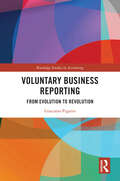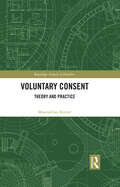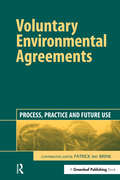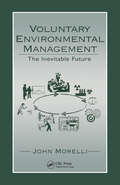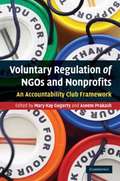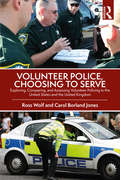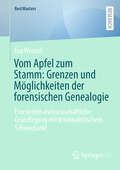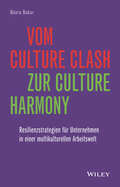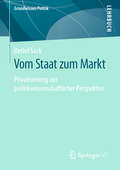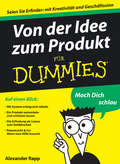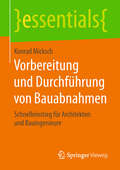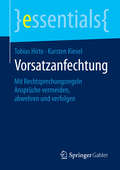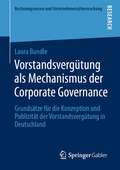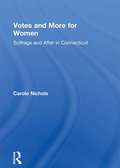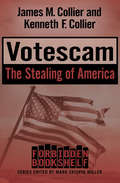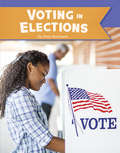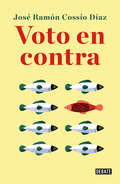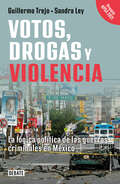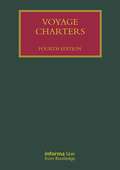- Table View
- List View
Voluntary Business Reporting: From Evolution to Revolution (Routledge Studies in Accounting)
by Giacomo PigattoUnderstanding the dynamic landscape of voluntary business reporting is crucial for navigating the evolving complexities of accounting practices, towards achieving a more sustainable and equitable world. This book provides a comprehensive exploration of the evolution and revolutions happening within the field of voluntary business reporting.The book begins by tracing the development of voluntary business reporting to the present day, examining the motivations behind voluntary reporting practices, including agency theory, stakeholder theory, and institutional perspectives. It offers a thorough overview of voluntary business reporting, its evolution in the business world, and its increasing relevance for disclosing nonfinancial information alongside – and often integrated with – financial information. Through empirical insights and case studies, the book uncovers instances where voluntary reporting diverges from traditional theories, highlighting factors such as chance discoveries and power struggles. Furthermore, it analyzes three revolutions characterizing voluntary reporting: (1) the mandatorization (i.e., the slow yet steady process of codification and regulation), (2) the broadening scope towards a multi-stakeholder perspective, and (3) the harmonization and integration of voluntary reporting standards and frameworks. It concludes by reflecting on the unresolved issues and challenges facing the field, emphasizing the need for ongoing research and critical reflection to advance the practice of voluntary reporting in alignment with broader societal goals.With a focus on the implications of voluntary reporting for stakeholders, businesses, and regulatory bodies, the book equips readers with actionable insights. It caters primarily to accounting and business reporting scholars. Additionally, it serves as a valuable resource for students in related disciplines and business reporting practitioners seeking insights into evolving trends and future developments in voluntary reporting practices.
Voluntary Consent: Theory and Practice (Routledge Annals of Bioethics)
by Maximilian KienerVoluntariness is a necessary condition of valid consent. But determining whether a person consented voluntarily can be difficult, especially when people are subjected to coercion or manipulation, placed in a situation with no acceptable alternative other than to consent to something, or find themselves in an abusive relationship. This book presents a novel view on the voluntariness of consent, especially medical consent, which the author calls Interpersonal Consenter-Consentee Justification (ICCJ). According to this view, consent is voluntary if and only if the process by which it has been obtained aligns with specific principles of interpersonal justification. ICCJ is distinctive because it explains voluntary consent neither as a ‘psychological’ concept indicative of the inner states of a person’s mind (e.g. willingness or reluctance) nor as a ‘circumstantial’ concept indicative of a person’s set of options. Rather, ICCJ explains the voluntariness of consent as an ‘interpersonal’ concept requiring the absence of illegitimate control within the interaction between the person giving consent and the person receiving it. In so doing, ICCJ further develops the notion of interpersonal justification, known from contractualist theories in moral philosophy, and introduces it to the debate on consent. The author employs a top-down approach, defending ICCJ’s key characteristics on the basis of general theoretical arguments, as well as a bottom-up approach, supporting ICCJ in its application to clinical challenges such as nudging and manipulation, living organ donation, and clinical trials. Voluntary Consent will appeal to researchers and advanced students in normative ethics, bioethics, philosophy of law, behavioural psychology, and medicine.
Voluntary Environmental Agreements: Process, Practice and Future Use
by Patrick Ten BrinkVoluntary environmental agreements (VEAs) – generally agreements between government and business – have been regarded by many as a key new instrument for meeting environmental objectives in a flexible manner. Their performance to date has, however, also led to considerable criticism, with several parties arguing that they are methods for avoiding real action that goes beyond "business-as-usual". Is either of these positions justified?The aim of this book is to highlight and learn the lessons from existing experience, looking not just at results but also at specific elements of agreements and also at the process of the agreement itself. Lessons are drawn from experience from across the world, covering the full range of environmental challenges, and from the perspective of key stakeholder groups. Importantly, the book also presents tools for assessing and improving existing agreements and includes recommendations and guidelines for future agreements in key areas such as climate change. It also deals at length with the problem of how such agreements might be used in developing and transitional economies.The overall view of the book is that there is a real potential for the future use of VEAs as part of the policy mix and as a tool for sharing the responsibility for meeting environmental objectives. For the agreements to play this role, however, significant steps are needed to ensure that they are effective, efficient, equitable and appropriately linked to a portfolio of other instruments.The book is divided into four sections. First, existing agreements, their development and efficacy are considered; second, the prospects for voluntary agreements in developing and transitional economies are discussed; third, a range of authors examine the role of VEAs as part of the policy mix to combat climate change; and, finally, the book concludes with an examination of how new tools for evaluating and improving VEAs could be utilized in the future.Voluntary Environmental Agreements will be of interest not only to academics, governments and businesses wishing to understand this specific instrument, but also to those already implementing or considering applying VEAs to meet their environmental objectives.
Voluntary Environmental Management: The Inevitable Future
by John MorelliA shift from government oversight to private sector self-regulation appears to be the future of environmental management. This will be a complex and complicated transition, as individual companies attempt to balance their needs against that of the surrounding communities - and world.Voluntary Environmental Management: The Inevitable Future explores how business and industry are preparing for this dramatic shift in responsibility and accountability.John Morelli pinpoints companies that have already adopted environmental auditing and management tools; examines the deficiencies of government-imposed environmental regulations; and shows how businesses can become more proactive in monitoring and managing their environmentally affective activities.The role of global marketplace forces receives substantial emphasis in Voluntary Environmental Management: The Inevitable Future, especially in light of the widespread international acceptance of new ISO 14000 standards.
Voluntary Regulation of Ngos and Nonprofits
by Mary Kay Gugerty Aseem PrakashHow can nonprofit organizations and NGOs demonstrate accountability to stakeholders and show that they are using funds appropriately and delivering on their promises? Many nonprofit stakeholders, including funders and regulators, have few opportunities to observe nonprofit internal management and policies. Such information deficits make it difficult for "principals" to differentiate credible nonprofits from less credible ones. This volume examines a key instrument employed by nonprofits to respond to these challenges: voluntary accountability clubs. These clubs are voluntary, rule-based governance systems created and sponsored by nongovernmental actors. By participating in accountability clubs, nonprofits agree to abide by certain rules regarding internal governance in order to send a signal of quality to key principals. Nonprofit voluntary programs are relatively new but are spreading rapidly across the globe. This book investigates how the emergence, design, and success of such initiatives vary across a range of sectors and institutional contexts in the United States, the Netherlands, Africa, and Central Europe.
Volunteer Police, Choosing to Serve: Exploring, Comparing, and Assessing Volunteer Policing in the United States and the United Kingdom
by Ross Wolf Carol Borland JonesVolunteer Police, Choosing to Serve provides an in-depth comparison between volunteer policing in the United States and in the United Kingdom, and explores the shared past and similar—yet sometimes divergent—evolution of special constables, auxiliaries, and reserves. It discusses the history of volunteer policing, contemporary authority, functions, and training. The book also examines part-time, auxiliary, and special constable policing roles around the globe. The text contains original research comparing British and American volunteer police, and concludes with a discussion of the future of volunteer policing in the UK and US contexts.
Vom Apfel zum Stamm: Eine kriminalwissenschaftliche Grundlegung mit kriminalistischem Schwerpunkt (BestMasters)
by Eva WenzelObwohl die DNA-Analyse seit der Entdeckung des genetischen Fingerabdrucks große Fortschritte gemacht hat, bleiben immer noch etwa zwei Drittel aller Spuren in der DNA-Analyse-Datei, der nationalen DNA-Datenbank, ohne Treffer. Diese erhebliche Menge nicht zuordenbarer Spuren lässt eine wissenschaftlich-forensische sowie auch aus Sicht der Opfer schwerwiegender Straftaten eine evidente kriminalwissenschaftliche Lücke erkennen. Seit 2017 wird daher über neue Ansätze wie die forensische Genealogie diskutiert. Diese Methode kombiniert die klassische DNA-Analyse mit genealogischen Verfahren und kann beispielsweise dabei helfen, unbekannte Tote zu identifizieren oder ungelöste Fälle aufzuklären. Hierzu wird das fragliche DNA-Material mit Daten aus genealogischen DNA-Datenbanken abgeglichen, die keinen primär strafprozessualen Zweck verfolgen. Der Einsatz genetischer Daten aus solchen Datenbanken eröffnet neue Ermittlungsansätze, wirft jedoch auch Fragen auf: Welche gesetzlichen Regelungen gelten für die forensische Genealogie in Deutschland? Ist ihre Anwendung ethisch vertretbar? Wie steht es um den Datenschutz? Gibt es in Deutschland überhaupt genügend verfügbare genetische Datensätze, um diese Methode erfolgreich anzuwenden?
Vom Culture Clash zur Culture Harmony: Resilienzstrategien für Unternehmen in einer multikulturellen Arbeitswelt
by Busra BakarDas Buch von Dr. sc. Büsra Bakar beleuchtet die Herausforderungen und Chancen, die sich aus der zunehmenden Diversität am Arbeitsplatz ergeben. Es bietet einen tiefen Einblick in die Auswirkungen kultureller Unterschiede auf Teams und Organisationen und präsentiert gleichzeitig praxiserprobte Resilienzstrategien, um diese Vielfalt als strategischen Vorteil zu nutzen. Von interkulturellen Kommunikationshindernissen bis hin zur Förderung einer integrativen Unternehmenskultur bietet dieses Buch konkrete Lösungen für Führungskräfte und Teams, die in einer multikulturellen Umgebung erfolgreich sein wollen. Die Autorin erläutert, wie die Anpassungsfähigkeit gegenüber kulturellen Unterschieden nicht nur zu einem harmonischeren Arbeitsumfeld führt, sondern auch die Grundlage für langfristigen unternehmerischen Erfolg legt.
Vom GREEN Campus zur ORANGE Alma Mater: Nachhaltig leben, lehren und forschen
by Julia KrauseNachhaltigkeit an Hochschulen braucht einen neuen Ansatz – umfassend, vernetzt und strategisch. Hochschulen tragen die Verantwortung, Nachhaltigkeit in Lehre, Forschung und Campusleben ganzheitlich zu verankern und als Vorbild für Gesellschaft und Zukunft zu wirken. Dieses Buch zeigt, wie Hochschulen Nachhaltigkeit als festen Bestandteil ihrer Identität etablieren und alle relevanten Bereiche sowie interne und externe Akteure einbeziehen können. Mit dem ORANGE-Konzept (Orientation, Research, Alliance, Networks, Governance, Education) präsentiert die Autorin eine praxisnahe Roadmap, um Nachhaltigkeit systematisch und Inspirierend umzusetzen. Das Modell macht die wichtigsten Handlungsfelder sichtbar, fördert den Austausch und motiviert dazu, innovative Wege zu gehen – einfach, verständlich und für alle Stakeholder zugänglich. Das Buch richtet sich an Hochschulleitungen, Nachhaltigkeitsbeauftragte, Forschende und alle, die Hochschulen als Motor nachhaltiger Transformation begreifen. Es lädt dazu ein, Nachhaltigkeit kreativ und intuitiv zu gestalten und die Zukunft der Hochschullandschaft aktiv mitzuprägen. Der Inhalt Grundlagen der Nachhaltigkeit und Status Quo der Bewegung an Hochschulen Das ORANGE-Konzept Die ORANGE Alma Mater – ein Ort des Wandels Die Hochschule von morgen – Vision einer nachhaltigen Zukunftshochschule
Vom Staat zum Markt: Privatisierung aus politikwissenschaftlicher Perspektive (Grundwissen Politik)
by Detlef SackPrivatisierung ist keine wirtschaftliche Notwendigkeit, sondern das Ergebnis von Politik. Das Lehrbuch führt in die politikwissenschaftliche Privatisierungsforschung im internationalen Vergleich ein. Es stellt grundlegende Definitionen, Konzepte und Theorien vor, mit denen Entstaatlichung im öffentlichen Sektor untersucht wird. Insgesamt thematisiert der Band die (machtpolitischen) Gründe für Privatisierung wie die Effekte der Entstaatlichung, die begleitende Regulierung und die Konsequenzen für demokratische Politik. Der Band skizziert die zukünftigen Aufgaben und Möglichkeiten der politikwissenschaftlichen Privatisierungsforschung.
Vom „Theater des Schreckens“ zum „peinlichen Rechte nach der Vernunft“: Literatur und Strafrecht im 17. und 18. Jahrhundert (Literatur und Recht #5)
by Eric Achermann Gideon StieningDas Strafrecht der frühen Neuzeit erfährt zwischen dem beginnenden 17. und dem späten 18. Jahrhundert in Theorie und Praxis grundstürzende Veränderungen. Vor allem im Zuge der Aufklärung wird es entschärft, rationalisiert und teilweise humanisiert. Diese Prozesse werden von der europäischen Literatur kritisch reflektiert und kommentiert, womit es ihr häufig gelingt, in die Strafpraxis einzugreifen. Der Band klärt die moralphilosophischen Grundlagen dieser Entwicklung und untersucht das Wechselverhältnis von Literatur und Recht in Einzelstudien zu bedeutenden Werken der Zeit.
Von der Idee zum Produkt für Dummies (Für Dummies)
by Alexander RappDaniel Düsentrieb hat es leicht: Sein Genie gibt ihm die Erfindungen ein, über Finanzierung und Patentrecht muss er sich keine Gedanken machen. Das ist schön, die Wirklichkeit ist leider etwas komplizierter: Alexander Rapp zeigt Ihnen, wie Sie als Erfinder systematisch arbeiten, wie Sie Ideen bewerten, diese dann umsetzen und schließlich Ihr Werk auf Herz und Nieren prüfen. Er erklärt Ihnen außerdem, was der Unterschied zwischen Patent und Gebrauchsmuster ist und wie Sie Ihre Erfindung am besten schützen. Schließlich gibt er Ihnen noch Anregungen, wie Sie mit Investitionen und Lizenzen Ihres Geistes Kind zu Geld machen können.
Vorbereitung und Durchführung von Bauabnahmen: Schnelleinstieg für Architekten und Bauingenieure (essentials)
by Konrad MickschDie fachgerechte und ordnungsgemäße Abnahme von Bauleistungen und Gebäuden ist für alle an Bauabnahmen Beteiligten im Bereich der Objektüberwachung komplex und birgt viele Fallstricke. Der Autor beschreibt, was bei der organisatorischen, technischen und rechtlichen Vorbereitung von Abnahmen zu beachten und was bei Störungen der Bauabnahme durch auftretende Mängel zu tun ist. Er informiert darüber, welche Dokumente, Qualitätsnachweise und Erklärungen bei der Abnahme erforderlich sind. Übersichten, Checklisten und Musterformulare runden den Schnelleinstieg in die Thematik ab.Der AutorDipl.-Ing., Dipl.-Ing.-Ök. Konrad Micksch arbeitete viele Jahre als Projekt- und Oberbauleiter im schlüsselfertigen Bahn-, Brücken-, Sport-, Gesellschafts- und Anlagenbau im In- und Ausland.
Vorbeugender Brandschutz in der Gebäudeplanung: Vom Entwurf zum Brandschutzkonzept
by Claus LangeDas Lehrbuch vermittelt anschaulich Grundlagen zur brandschutztechnischen Planung von Gebäuden mit unterschiedlichen Nutzungen. Dabei werden die Schutzziele des vorbeugenden Brandschutzes sowie die baulichen, technischen und organisatorischen Brandschutzmaßnahmen vor dem Hintergrund der Verknüpfung mit dem abwehrenden Brandschutz eingehend erläutert sowie praxisgerecht dargestellt. Vertiefende Einblicke in die Rettungswegsicherung sowie die Anwendung von Ingenieurmethoden des Brandschutzes runden das Werk ab. Ein Anhang mit Übersichten zu brandschutztechnischen Anforderungen an unterschiedliche Gebäudearten (z. B. Wohn- und Geschäftshäuser, Büro- und Verwaltungsgebäude, Versammlungsstätten, Krankenhäuser, Industriebauten) sowie ein ausführliches Glossar können zum schnellen Nachschlagen wichtiger Fakten genutzt werden. Das Werk eignet sich auch als Nachschlagewerk für Praktiker bei der Erstellung von Brandschutzkonzepten.
Vorsatzanfechtung: Mit Rechtsprechungsregeln Ansprüche vermeiden, abwehren und verfolgen (essentials)
by Tobias Hirte Karsten KieselTobias Hirte und Karsten Kiesel stellen Rechtsprechungsregeln für Vorsatzanfechtungsfälle gemäß § 133 InsO unter Nennung der jeweils wesentlichen Entscheidungen des Bundesgerichtshofs dar, die im Zusammenhang mit Vorsatzanfechtungssachverhalten stehen. Dabei wird besonderes Augenmerk auf Indizien, Beweisanzeichen sowie Beweiserleichterungen gelegt. Anhand dieser Kriterien lassen sich allgemeine Erwägungen ableiten, die für Fälle der Vorsatzanfechtung gelten. Die Vorsatzanfechtung ist sowohl für den Insolvenzverwalter, und damit für die Gläubiger im Rahmen eines Insolvenzverfahrens, als auch für die (potenziellen) Anfechtungsgegner ein bedeutendes Thema.
Vorschlagswesen zur Innovation in der Öffentlichen Verwaltung: Mitarbeiterinnen und Mitarbeiter treiben die Veränderung (essentials)
by Hans-Dieter Schat Gottfried RichenhagenDie öffentliche Verwaltung unterliegt einem großen Veränderungsdruck durch die Digitalisierung (Onlinezugangsgesetz!) und die Demografie (Fachkräftemangel und Generation Y in den Verwaltungen, "Digital Natives" und anspruchsvolle ältere Seniorinnen und Senioren als Bürger). Dadurch ist der Kostendruck schon fast zur Gewohnheit geworden. Öffentliche Verwaltungen bestehen aus Menschen. Wenn die Mitarbeitenden in den Verwaltungen nicht mitgenommen werden, dann wird ein Wandel nicht gelingen. Mit dem Vorschlagswesen wird ein bewährtes Konzept vorgestellt. Hier können die Mitarbeitenden selbst aktiv werden und ihre Sicht einbringen. Dies führt zu einer neuen Kultur in der Verwaltung.
Vorstandsvergütung 2020: Ein Beitrag zur Entwicklung der Vergütung nach Umsetzung der ARUG II-Richtlinie und der DCGK Reform 2020 (Juridicum - Schriften zum Unternehmens- und Wirtschaftsrecht)
by Florian TimmerAusufernde Vergütungen für Vorstände von börsennotierten Aktiengesellschaften entsprechen einem öffentlichen Vorurteil. Das gilt gerade dann, wenn die Gesellschaften selbst zuvor keine ebenso hohen Gewinne erwirtschafteten oder die Börsenkurse ins Wanken gerieten. Auch sonst sorgten millionenhohe Vergütungen oft für öffentliches Unverständnis. Aus diesem Grund hat der europäische Gesetzgeber mit Erlass der zweiten Aktionärsrechterichtlinie (2. ARRL) einen weiteren Regulierungsversuch unternommen, um diesem Phänomen einen Riegel vorzuschieben. In Deutschland wurde die Richtlinie durch das zweite Aktionärsrechterichtlinien-Umsetzungsgesetz (ARUG II) in nationales Recht überführt. In unmittelbarem Zusammenhang damit wurde auch der Deutsche Corporate Governance Kodex in seiner ab 2020 geltenden Fassung (DCGK 2020) deutlich überarbeitet. Auf der Basis dieser Neuerungen wertet dieses Werk aus, ob bekannte Probleme der Vergütung gelöst wurden. Zudem wird die neue Gesetzeslage kritisch gewürdigt. Abschließend wird auf die impliziten Auswirkungen eingegangen.
Vorstandsvergütung als Mechanismus der Corporate Governance: Grundsätze für die Konzeption und Publizität der Vorstandsvergütung in Deutschland (Rechnungswesen und Unternehmensüberwachung)
by Laura BundleDie Vorstandsvergütung stellt einen wesentlichen Mechanismus der Corporate Governance dar. Durch das Gesetz zur Umsetzung der zweiten Aktionärsrechterichtlinie (ARUG II) werden neue Anforderungen an die Konzeption und Publizität der Vorstandsvergütung gestellt. Die Verfasserin unterzieht die Änderungen der vergütungsbezogenen Corporate-Governance-Mechanismen einer umfassenden normativen und empirisch-deskriptiven Analyse. Es wird untersucht, ob durch das ARUG II eine Verbesserung der Corporate Governance in Deutschland erfolgt. Durch die Entwicklung von Grundsätzen für die Vorstandsvergütung normiert Laura Bundle weiterführende Anforderungen an die Konzeption und Publizität der Vorstandsvergütung.Die AutorinDr. Laura Bundle promovierte als wissenschaftliche Mitarbeiterin bei Prof. Dr. Hans-Joachim Böcking an der Professur für Betriebswirtschaftslehre, insbesondere Wirtschaftsprüfung und Corporate Governance an der Goethe-Universität Frankfurt am Main.
Votes and More for Women: Suffrage and After in Connecticut
by Carole NicholsThis fascinating book demonstrates the diversity of Connecticut’s women’s feminist activities in pre- and post-suffrage eras and refutes the notion that feminist activism died out with the passage of the Nineteenth Amendment.
Votescam: The Stealing of America (Forbidden Bookshelf #15)
by James M. Collier Kenneth F. CollierThe groundbreaking investigation into the corruption of American democracy, beginning at the voting booth This book is the culmination of a 25-year investigation into computerized vote fraud in the United States. Journalists James and Kenneth Collier pose the question, "Why can't we vote the bastards out?" Their answer: "Because we didn't even vote the bastards in." Votescam fills in the blanks for anyone who senses that their ballot is worthless, but does not know why. It tracks down, confronts, and calls the names of Establishment thieves who silently steal votes for their own profit. It comes face-to-face with the Supreme Court justice who buried key vote fraud evidence; the most powerful female publisher in America, who refused to permit her newspapers and television stations to expose vote rigging; the Attorney General who jailed Jim Collier to avoid an investigation into vote fraud; and a cast of weak-kneed, corrupt politicians, lawyers, and members of the media entangled in a massive crime, but who have yet to be held accountable. First published in 1992, this groundbreaking exposé has been updated by journalist Victoria Collier, daughter and niece, respectively, of the late James and Kenneth Collier, and editor of Votescam.org, to reflect modern threats to American democracy. As computers grow ever more powerful, the need to read Votescam is increasingly urgent.
Voting Rights of Refugees
by Ruvi ZieglerVoting Rights of Refugees develops a novel legal argument about the voting rights of refugees recognised in the 1951 Geneva Convention. The main normative contention is that such refugees should have the right to vote in the political community where they reside, assuming that this community is a democracy and that its citizens have the right to vote. The book argues that recognised refugees are a special category of non-citizen residents: they are unable to participate in elections of their state of origin, do not enjoy its diplomatic protection and consular assistance abroad, and are unable or unwilling, owing to a well-founded fear of persecution, to return to it. Refugees deserve to have a place in the world, in the Arendtian sense, where their opinions are significant and their actions are effective. Their state of asylum is the only community in which there is any prospect of political participation on their part.
Voting in Elections (U.S. Government)
by Amy KortuemWhat is an election? Learn about elections and why it is important that people vote. Descriptive main text, full-color photos, fast facts, and callout definitions work together to support understanding.
Voto en contra
by José Ramón Cossío DíazEste libro muestra uno de los rostros más luminosos de México: el de la pluralidad, la inteligencia y las instituciones. En los últimos 15 años, México ha librado algunas de sus batallas más importantes... en la Suprema Cortede Justicia de la Nación. Ahí se han debatido -y definido- los límites a la libertad de expresión, los derechos de los indígenas a juicios justos, las fronteras de la privacidad, la inclusión, el valor de los tratados internacionales e incluso el "derecho a la irreverencia", entre muchos otros. Y poco a poco, gracias a jueces como José Ramón Cossío, las perspectivas más progresistas han ido ganando terreno. En esta obra, el exministro explica con sencillez y pasión algunos de los votos más importantes de su carrera: aquéllos en los que discrepó con la mayoría, pero que a la larga permitieron más derechos, más democracia, más pluralidad. Voto en contra revela, así, un país dinámico, vibrante y complejo, en el que la inteligencia y las instituciones pueden librar y ganar las batallas más trascendentes.
Votos, drogas y violencia
by Guillermo Trejo¿POR QUÉ A MEDIDA QUE LA DEMOCRACIA SE HA CONSOLIDADO EN MÉXICO LA VIOLENCIA A GRAN ESCALA SE HA MULTIPLICADO?. Guillermo Trejo y Sandra Ley ofrecen en este libro una teoría novedosa y necesaria sobre la violencia criminal, que enfatiza la influencia crucial de la política. A partir de estudios de caso en profundidad y análisis estadísticos que abarcan más de dos décadas y distintos niveles de gobierno, muestran que los procesos de transición democrática, aunados a la fragmentación del poder político, pudieron ser la causa principal del estallido e intensificación de las guerras en México, así como su expansión a las esferas de la política local y la sociedad civil. A diferencia de estudios previos, que ven a los grupos de crimen organizado como empresas económicas libres que operan en oposición a las autoridades estatales, Trejo y Ley los conciben como grupos ilegales íntimamente relacionados con el Estado. Por tanto, estos grupos responden al cambio político: el crimen organizado no puede existir ni operar con éxito si no cuenta con algún grado de protección estatal. Los autores denominan a esa intersección colaborativa zona gris, un espacio donde los grupos criminales pueden respirar, crecer, reproducirse y triunfar. Sin embargo, cuando la esfera del poder estatal cambia, el equilibrio de la zona gris también lo hace y eso genera violencia. Votos, drogas y violencia propone un nuevo enfoque político que amplía nuestra comprensión del crimen organizado y de las condiciones que propician la guerra y la paz en el inframundo criminal.
Voyage Charters (Lloyd's Shipping Law Library)
by Andrew Taylor Michael Ashcroft John Kimball Julian Cooke David Martowski LeRoy Lambert Michael Sturley Tim YoungWidely regarded as the leading authority on voyage charters, this book is the most comprehensive and intellectually-rigorous analysis of the area, is regularly cited in court and by arbitrators, and is the go-to guide for drafting and disputing charterparty contracts. Voyage Charters provides the reader with a clause-by-clause analysis of the two major charterparty forms: the Gencon standard charterparty contract and the Asbatankvoy form. It also delivers thorough treatment of COGSA and the Hague and Hague-Visby Rules, a comparative analysis of English and United States law, and a detailed section on arbitration awards. Key features of the fourth edition: The only textbook to deal specifically with this key area of maritime law Written by an impressive team of highly-regarded maritime authorities from both sides of the Atlantic Contains a wealth of updated English and American case law and arbitrations, as well as addressing broader issues such as Rome II Regulation Convention regarding the conflict of laws Practical user-friendly guide, which is accessible not only to lawyers but also shipping professionals A new, detailed United States law section on COGSA This book is an indispensable, practical guide for both contentious and non-contentious shipping law practitioners, and postgraduate students studying this area of law.
